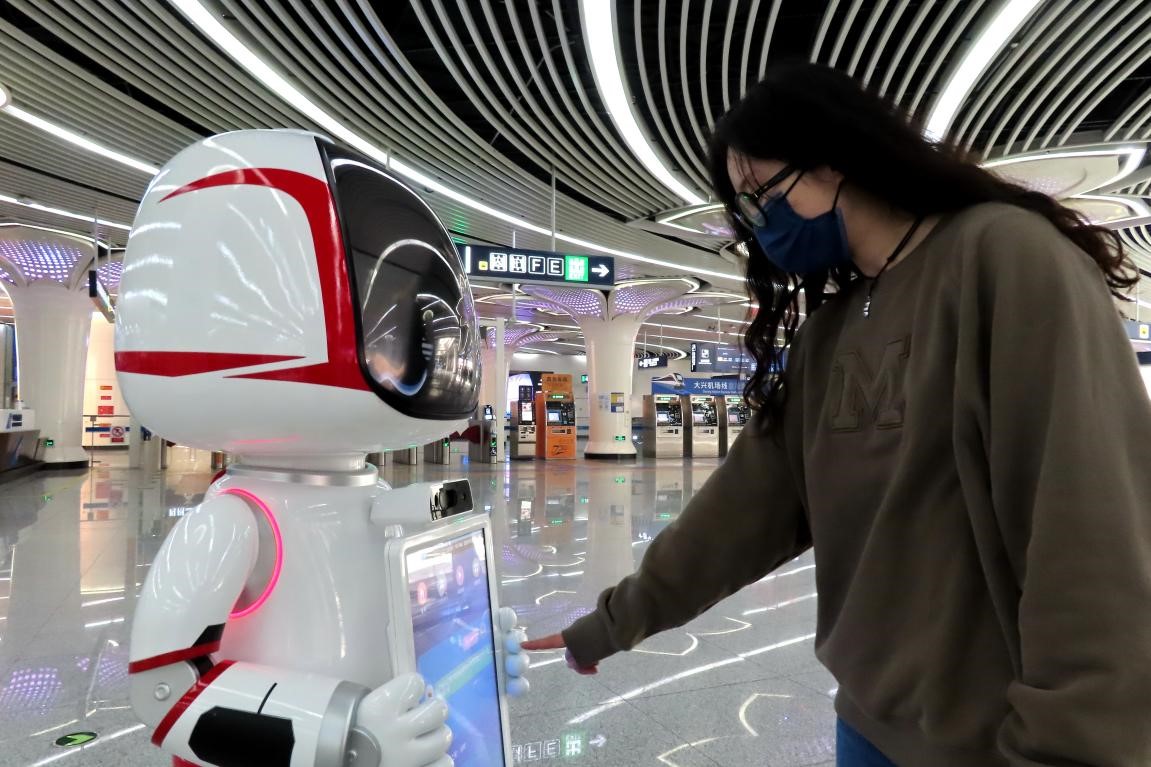Technology gives a leg up to smart transportation
Nowadays, facial scanning has replaced high-speed train tickets, and median barriers can be remotely controlled to adjust traffic flow. What's more, automated parking systems have freed drivers from parking and pulling out.

A "skyshuttle" and a new energy bus run in Bishan district, southwest China's Chongqing municipality, July 14, 2021. (People's Daily Online/Hu Yuejian)
Grasping the opportunities brought by digital economy and being integrated with big data technology, the transportation sector has become smarter over the recent years.
According to a guideline on the long-term development of transportation technology jointly issued by the Ministry of Transport and the Ministry of Science and Technology, China will vigorously develop intelligent transportation, speed up the application of a new generation of information technology and aerospace information technology in the transportation sector, and accelerate the building of new transportation infrastructure.
Smart roads have embraced prosperous development over the recent years as roads are digitalized and made internet-based.
As the first pilot project of smart expressway in east China's Shandong province, the Tai'an-Zaozhuang section of the Beijing-Taipei Expressway has adopted a series of smart technologies.
It can maintain smooth traffic by acquiring precise information on the road. Within 20 kilometers from the Manzhuang entrance of the expressway in Tai'an, Shandong province, there is a pole by the side of the road every 200 meters, on which a communication unit is installed. The unit receives traffic information and sends it to relevant vehicles for smoother traffic.

A passenger checks information from a smart service robot at the Caoqiao station of the Daxing Airport Express of the Beijing Subway, April, 10, 2022. (People's Daily Online/He Luqi)
Besides, there are 182 high-definition surveillance cameras, 15 sets of omnidirectional millimeter-wave radars and 33 sets of laser radars along the Beijing-Taipei Expressway. The traffic information collected by the equipment is transmitted to a smart traffic control platform, and then the platform processes the data it receives and gives precise evaluation of current traffic conditions.
A man surnamed Wang, who works in Tai'an, once had a vehicle failure on the expressway. Just seconds after he pulled over, he received a reminder from the smart traffic control platform. Meanwhile, Wang's location was reported to relevant traffic control departments by the platform. In less than 10 minutes, rescue staffs showed up at the location and towed Wang's vehicle to the nearest exit.
"Now, surveillance camera-enabled automatic inspection has reduced the average disposal time of traffic accidents from 28 minutes to 19 minutes per case, improving disposal efficiency by 32.1 percent," said Shi Ning, who works at the command and dispatching center of the expressway.
Fan Shujian, an official with the Ministry of Industry and Information Technology said the upgrading of the transportation sector driven by digital technologies has shaped new business models and forms that improve the safety and efficiency of urban roads and expressways.

The expansion project of G5517, the expressway linking Changsha and Yiyang in central China's Hunan province, is put into use, Aug. 31, 2020. It is the first smart expressway in China that is open to test vehicles of 5G-enabled autopilot. (People's Daily Online/Li Jian)
Recently, a batch of smart service robots started their "careers" at the Caoqiao station of the Daxing Airport Express of the Beijing Subway. These speech-interactive machines provide route information and schedule and are able to guide passengers to the locations they want.
In Fuzhou, southeast China's Fujian province, a smart parking system has been constructed. It enables drivers to search for and reserve available parking spaces online.
Hangzhou, east China's Zhejiang province, introduced to its taxi fleet a number of barrier-free cabs that can carry six passengers at most. These cabs have access ramps and can be hailed on mobile applications.
In the future, China will further enhance its innovation in the transportation sector to promote faster and better development of new infrastructure and smart transportation.
Photos
Related Stories
- China ramps up support to unclog transport logistics
- China's achievements in transportation over the past decade
- Highlights of China's transportation development in past decade
- China now one of world's busiest countries in transportation
- E China's railway company tries to meet transportation needs of enterprises
- China to improve cold-chain logistics, transportation
- China maps five-year plan for transportation development
- China needs to boost comprehensive upgrade of transportation networks: official
- China unveils plan to improve transportation networks by 2025
- Mega-projects, world-leading developments build transportation strength
- China quickens steps toward smart transportation
Copyright © 2022 People's Daily Online. All Rights Reserved.









